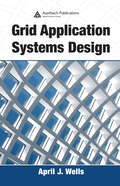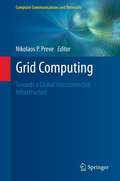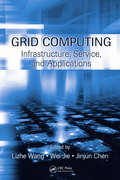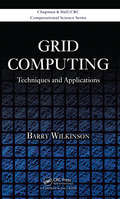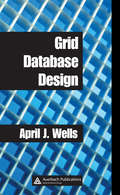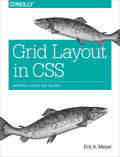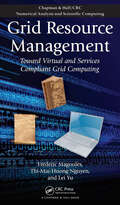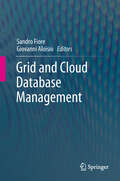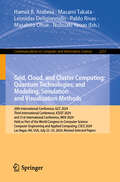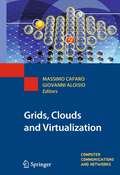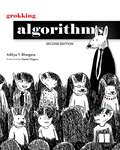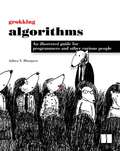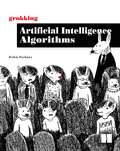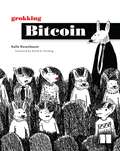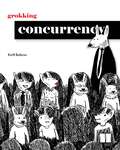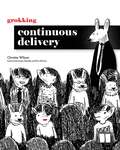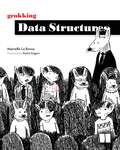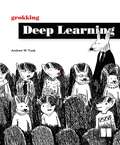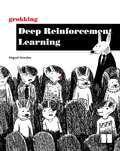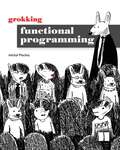- Table View
- List View
Grid Application Systems Design
by April J. WellsGrid computing is an emerging technology designed for high-powered applications. Grid Application Systems Design shows how to unleash the high performance of Grid technology. It begins by delving into the history and theory of grid computing, providing background on the concepts, terminology, and issues surrounding it. The book then examine
Grid Computing
by Nikolaos P. PreveThis book presents research from many of the major projects involved in the emerging global grid infrastructure. With a particular focus on the practical advantages and applications of grid computing - including real case studies - the book provides an in-depth study of grid technology for a wide range of different needs. Topics: examines a remote instrumentation infrastructure, and a methodology to support e-science applications on e-infrastructures; describes the GEMS storage system, and pipeline workflows for optimizing end-to-end performance in wide-area networks; investigates semantic grid system architecture, social grid agents, and monitoring platforms designed for large-scale distributed systems; explores job control using service-level agreements; introduces the Composable Services Architecture for dynamic service provisioning, and the semantically driven communication middleware platform, Phoenix; discusses the PhyloGrid application, and a numerical simulation performed using grid computing.
Grid Computing: Infrastructure, Service, and Applications
by Lizhe Wang Wei Jie Jinjun ChenIdentifies Recent Technological Developments Worldwide The field of grid computing has made rapid progress in the past few years, evolving and developing in almost all areas, including concepts, philosophy, methodology, and usages. Grid Computing: Infrastructure, Service, and Applications reflects the recent advances in this field, covering the research aspects that involve infrastructure, middleware, architecture, services, and applications. Grid Systems Across the Globe The first section of the book focuses on infrastructure and middleware and presents several national and international grid systems. The text highlights China Research and Development environment Over Wide-area Network (CROWN), several ongoing cyberinfrastructure efforts in New York State, and Enabling Grids for E-sciencE (EGEE), which is co-funded by the European Commission and the world’s largest multidisciplinary grid infrastructure today. The second part of the book discusses recent grid service advances. The authors examine the UK National Grid Service (NGS), the concept of resource allocation in a grid environment, OMIIBPEL, and the possibility of treating scientific workflow issues using techniques from the data stream community. The book describes an SLA model, reviews portal and workflow technologies, presents an overview of PKIs and their limitations, and introduces PIndex, a peer-to-peer model for grid information services. New Projects and Initiatives The third section includes an analysis of innovative grid applications. Topics covered include the WISDOM initiative, incorporating flow-level networking models into grid simulators, system-level virtualization, grid usage in the high-energy physics environment in the LHC project, and the Service Oriented HLA RTI (SOHR) framework. With a comprehensive summary of past advances, this text is a window into the future of this nascent technology, forging a path for the next generation of cyberinfrastructure developers.
Grid Computing: Techniques and Applications (Chapman & Hall/CRC Computational Science)
by Barry WilkinsonDesigned for senior undergraduate and first-year graduate students, Grid Computing: Techniques and Applications shows professors how to teach this subject in a practical way. Extensively classroom-tested, it covers job submission and scheduling, Grid security, Grid computing services and software tools, graphical user interfaces, workflow editors,
Grid Database Design
by April J. WellsGrid Database Design investigates the origin, background, and components of this new computing model. This book presents new concepts and analyzes pre-existing ideas in the context of Grid, educating organizations as to how Grid can increase their computing power and strengthen their operations.Divided into three sections, the volume begins
Grid Layout in CSS: Interface Layout for the Web
by Eric A. MeyerCSS has had a layout-shaped hole at its center since the beginning. Designers have bent features such as float and clear to help fill that hole, but nothing has quite done the job. Now that’s about to change. With this concise guide, you’ll learn how to use CSS grid layout, a generalized system that lets you lay out pieces of your design independent of their document source order and with full awareness of the overall design.Short and deep, this book is an excerpt from the upcoming fourth edition of CSS: The Definitive Guide. When you purchase either the print or the ebook edition of Grid Layout in CSS, you’ll receive a discount on the entire Definitive Guide once it’s released. Why wait? Learn how to make your web pages come alive today.Explore the differences between grid boxes and block containersCreate block-level grids, inline grids, and even nest grids inside gridsLearn best practices for attaching elements to your layout, using explicitly defined grid lines or grid areaUnderstand how the implicit grid automatically adjusts for oversized elementsCreate gutters between grid elements, and align and justify individual itemsEric A. Meyer is an author, speaker, blogger, sometime teacher, and co-founder of An Event Apart. He’s a two-decade veteran of the Web and web standards, a past member of the W3C’s Cascading Style Sheets Working Group, and the author of O’Reilly’s CSS: The Definitive Guide.
Grid Optimal Integration of Electric Vehicles: Examples with Matlab Implementation
by Seddik Bacha Andrés Ovalle Ahmad HablyThis book is a compilation of recent research on distributed optimization algorithms for the integral load management of plug-in electric vehicle (PEV) fleets and their potential services to the electricity system. It also includes detailed developed Matlab scripts. These algorithms can be implemented and extended to diverse applications where energy management is required (smart buildings, railways systems, task sharing in micro-grids, etc.). The proposed methodologies optimally manage PEV fleets’ charge and discharge schedules by applying classical optimization, game theory, and evolutionary game theory techniques. Taking owner’s requirements into consideration, these approaches provide services like load shifting, load balancing among phases of the system, reactive power supply, and task sharing among PEVs. The book is intended for use in graduate optimization and energy management courses, and readers are encouraged to test and adapt the scripts to their specific applications.
Grid Resource Management: Toward Virtual and Services Compliant Grid Computing (Chapman & Hall/CRC Numerical Analysis and Scientific Computing Series)
by Lei Yu Frederic Magoules Thi-Mai-Huong NguyenGrid technology offers the potential for providing secure access to remote services, thereby promoting scientific collaborations in an unprecedented scale. Grid Resource Management: Toward Virtual and Services Compliant Grid Computing presents a comprehensive account of the architectural issues of grid technology, such as security, data management,
Grid and Cloud Database Management
by Giovanni Aloisio Sandro FioreSince the 1990s Grid Computing has emerged as a paradigm for accessing and managing distributed, heterogeneous and geographically spread resources, promising that we will be able to access computer power as easily as we can access the electric power grid. Later on, Cloud Computing brought the promise of providing easy and inexpensive access to remote hardware and storage resources. Exploiting pay-per-use models and virtualization for resource provisioning, cloud computing has been rapidly accepted and used by researchers, scientists and industries. In this volume, contributions from internationally recognized experts describe the latest findings on challenging topics related to grid and cloud database management. By exploring current and future developments, they provide a thorough understanding of the principles and techniques involved in these fields. The presented topics are well balanced and complementary, and they range from well-known research projects and real case studies to standards and specifications, and non-functional aspects such as security, performance and scalability. Following an initial introduction by the editors, the contributions are organized into four sections: Open Standards and Specifications, Research Efforts in Grid Database Management, Cloud Data Management, and Scientific Case Studies. With this presentation, the book serves mostly researchers and graduate students, both as an introduction to and as a technical reference for grid and cloud database management. The detailed descriptions of research prototypes dealing with spatiotemporal or genomic data will also be useful for application engineers in these fields.
Grid and Cloud Database Management
by Giovanni Aloisio Sandro FioreSince the 1990s Grid Computing has emerged as a paradigm for accessing and managing distributed, heterogeneous and geographically spread resources, promising that we will be able to access computer power as easily as we can access the electric power grid. Later on, Cloud Computing brought the promise of providing easy and inexpensive access to remote hardware and storage resources. Exploiting pay-per-use models and virtualization for resource provisioning, cloud computing has been rapidly accepted and used by researchers, scientists and industries.In this volume, contributions from internationally recognized experts describe the latest findings on challenging topics related to grid and cloud database management. By exploring current and future developments, they provide a thorough understanding of the principles and techniques involved in these fields. The presented topics are well balanced and complementary, and they range from well-known research projects and real case studies to standards and specifications, and non-functional aspects such as security, performance and scalability. Following an initial introduction by the editors, the contributions are organized into four sections: Open Standards and Specifications, Research Efforts in Grid Database Management, Cloud Data Management, and Scientific Case Studies.With this presentation, the book serves mostly researchers and graduate students, both as an introduction to and as a technical reference for grid and cloud database management. The detailed descriptions of research prototypes dealing with spatiotemporal or genomic data will also be useful for application engineers in these fields.
Grid, Cloud, and Cluster Computing; Quantum Technologies; and Modeling, Simulation and Visualization Methods: 20th International Conference, GCC 2024, Third International Conference, ICEQT 2024, and 21st International Conference, MSV 2024, Held as Part of the World Congress in Computer Science, Computer Engineering and Applied Computing, CSCE 2024, Las Vegas, NV, USA, July 22–25, 2024, Revised Selected Papers (Communications in Computer and Information Science #2257)
by Hamid R. Arabnia Leonidas Deligiannidis Masami Takata Pablo Rivas Masahito Ohue Nobuaki YasuoThis book constitutes the proceedings of the 20th International Conference on Grid, Cloud, and Cluster Computing, GCC 2024, the Third International Conference on Quantum Technologies, ICEQT 2024, and the 21st International Conference on Modeling, Simulation and Visualization Methods, MSV 2024, held as part of the 2024 World Congress in Computer Science, Computer Engineering and Applied Computing, in Las Vegas, USA, during July 22 to July 25, 2024. The proceedings include 15 papers from GCC and ICEQT 2024, which have been selected from a total of 63 submissions. For MSB 2024, the 5 papers included have been accepted from 26 submissions. They have been organized in topical sections as follows: Grid, cloud and cluster computing; emergent quantum technologies; and modeling, simulation and visualization methods.
Gridiron Gamer (Jake Maddox eSports)
by Jake MaddoxAs much as he would like to, Iako can’t play football. Being in a wheelchair keeps him from hitting the real gridiron. However, Iako makes up for it by being a whiz at his favorite video game, Football Blitz: Turbo. When his friends tell him he should play at a local esports tournament, Iako is hesitant. He doesn’t think he’s that good, and he doesn’t like crowds. But when Iako plays a pickup game and beats the current FB:T champion, he endures a lot of insults from the sore loser. With the support of his friends, Iako decides to enter the tournament to prove he can compete as well as anyone else. Will Iako’s skills help him defeat the current champ again and claim the title?
Grids, Clouds and Virtualization
by Giovanni Aloisio Massimo CafaroResearch into grid computing has been driven by the need to solve large-scale, increasingly complex problems for scientific applications. Yet the applications of grid computing for business and casual users did not begin to emerge until the development of the concept of cloud computing, fueled by advances in virtualization techniques, coupled with the increased availability of ever-greater Internet bandwidth. The appeal of this new paradigm is mainly based on its simplicity, and the affordable price for seamless access to both computational and storage resources. This timely text/reference introduces the fundamental principles and techniques underlying grids, clouds and virtualization technologies, as well as reviewing the latest research and expected future developments in the field. Readers are guided through the key topics by internationally recognized experts, enabling them to develop their understanding of an area likely to play an ever more significant role in coming years. Topics and features: presents contributions from an international selection of experts in the field; provides a thorough introduction and overview of existing technologies in grids, clouds and virtualization, including a brief history of the field; examines the basic requirements for performance isolation of virtual machines on multi-core servers, analyzing a selection of system virtualization technologies; examines both business and scientific applications of grids and clouds, including their use in the life sciences and for high-performance computing; explores cloud building technologies, architectures for enhancing grid infrastructures with cloud computing, and cloud performance; discusses energy aware grids and clouds, workflows on grids and clouds, and cloud and grid programming models. This useful text will enable interested readers to familiarize themselves with the key topics of grids, clouds and virtualization, and to contribute to new advances in the field. Researchers, undergraduate and graduate students, system designers and programmers, and IT policy makers will all benefit from the material covered.
Griffon in Action
by Andres Almiray Danno FerrinSummaryGriffon in Action is a comprehensive tutorial written for Java developers who want a more productive approach to UI development. After a quick Groovy tutorial, you'll immediately dive into Griffon and start building examples that explore its high productivity approach to Swing development.About the TechnologyYou can think of Griffon as Grails for the desktop. It is a Groovy-driven UI framework for the JVM that wraps and radically simplifies Swing. Its declarative style and approachable abstractions are instantly familiar to developers using Grails or JavaFX.About the BookGriffon in Action gets you going quickly. Griffon's convention-over-configuration approach requires minimal code to get an app off the ground, so you can start seeing results immediately. You'll learn how SwingBuilder and other Griffon "builders" provide a coherent DSL-driven development experience. Along the way, you'll explore best practices for structure, architecture, and lifecycle of a Java desktop application.Written for Java developers—no experience with Groovy, Grails, or Swing is required. Purchase of the print book comes with an offer of a free PDF, ePub, and Kindle eBook from Manning. Also available is all code from the book. What's InsideGriffon from the ground upFull compatibility with Griffon 1.0Using SwingBuilder and the other "builders"Practical, real-world examplesJust enough Groovy=======================================Table of ContentsPART 1 GETTING STARTEDWelcome to the Griffon revolutionA closer look at GriffonPART 2 ESSENTIAL GRIFFONModels and bindingCreating a viewUnderstanding controllers and servicesUnderstanding MVC groupsMultithreaded applicationsListening to notificationsTesting your applicationShip it!Working with pluginsEnhanced looksGriffon in front, Grails in the backProductivity tools
Grok 1.0 Web Development
by Carlos De GuardiaThe book takes a practical approach and dives into code right from the start. After learning how to install Grok, we create a simple application. We work on this application throughout the book, until its deployment in the last chapter. In each chapter, some new features of Grok will be introduced and explained, then the application will be extended to use them, explaining step-by-step how each feature works. This book is intended for Python developers who want to create web applications but have little or no experience in web development. If you have used other web frameworks but are looking for one that enables you to create more complex applications without losing agility, you will also benefit from this book. The reader is expected to have some basic Python knowledge and at least a general idea of how a web application works.
Grokking Algorithms, Second Edition
by Aditya Y BhargavaA friendly, fully-illustrated introduction to the most important computer programming algorithms.Master the most widely used algorithms and be fully prepared when you&’re asked about them at your next job interview. With beautifully simple explanations, over 400 fun illustrations, and dozens of relevant examples, you&’ll actually enjoy learning about algorithms with this fun and friendly guide! In Grokking Algorithms, Second Edition you will discover: Search, sort, and graph algorithms Data structures such as arrays, lists, hash tables, trees, and graphs NP-complete and greedy algorithms Performance trade-offs between algorithms Exercises and code samples in every chapter Over 400 illustrations with detailed walkthroughs The first edition of Grokking Algorithms proved to over 100,000 readers that learning algorithms doesn't have to be complicated or boring! This revised second edition contains brand new coverage of trees, including binary search trees, balanced trees, B-trees and more. You&’ll also discover fresh insights on data structure performance that takes account of modern CPUs. Plus, the book&’s fully annotated code samples have been updated to Python 3. Foreword by Daniel Zingaro. About the technology The algorithms you use most often have already been discovered, tested, and proven. Grokking Algorithms, Second Edition makes it a breeze to learn, understand, and use them. With beautifully simple explanations, over 400 fun illustrations, and dozens of relevant examples, it&’s the perfect way to unlock the power of algorithms in your everyday work and prepare for your next coding interview—no math required! About the book Grokking Algorithms, Second Edition teaches you important algorithms to speed up your programs, simplify your code, and solve common programming problems. Start with tasks like sorting and searching, then build your skills to tackle advanced problems like data compression and artificial intelligence. You&’ll even learn to compare the performance tradeoffs between algorithms. Plus, this new edition includes fresh coverage of trees, NP-complete problems, and code updates to Python 3. What's inside Search, sort, and graph algorithms Data structures such as arrays, lists, hash tables, trees, and graphs NP-complete and greedy algorithms Exercises and code samples in every chapter About the reader No advanced math or programming skills required. About the author Aditya Bhargava is a Software Engineer with a dual background in Computer Science and Fine Arts. He blogs on programming at adit.io. Table of Contents 1 Introduction to algorithms 2 Selection sort 3 Recursion 4 Quicksort 5 Hash tables 6 Beadth-first search 7 Trees 8 Balanced trees 9 Dijkstra&’s algorithm 10 Greedy algorithms 11 Dynamic programming 12 k-nearest neighbors 13 where to go next
Grokking Algorithms: An illustrated guide for programmers and other curious people
by Aditya BhargavaSummaryGrokking Algorithms is a fully illustrated, friendly guide that teaches you how to apply common algorithms to the practical problems you face every day as a programmer. You'll start with sorting and searching and, as you build up your skills in thinking algorithmically, you'll tackle more complex concerns such as data compression and artificial intelligence. Each carefully presented example includes helpful diagrams and fully annotated code samples in Python.Learning about algorithms doesn't have to be boring! Get a sneak peek at the fun, illustrated, and friendly examples you'll find in Grokking Algorithms on Manning Publications' YouTube channel.Continue your journey into the world of algorithms with Algorithms in Motion, a practical, hands-on video course available exclusively at Manning.com (www.manning.com/livevideo/algorithms-in-motion).Purchase of the print book includes a free eBook in PDF, Kindle, and ePub formats from Manning Publications.About the TechnologyAn algorithm is nothing more than a step-by-step procedure for solving a problem. The algorithms you'll use most often as a programmer have already been discovered, tested, and proven. If you want to understand them but refuse to slog through dense multipage proofs, this is the book for you. This fully illustrated and engaging guide makes it easy to learn how to use the most important algorithms effectively in your own programs.About the BookGrokking Algorithms is a friendly take on this core computer science topic. In it, you'll learn how to apply common algorithms to the practical programming problems you face every day. You'll start with tasks like sorting and searching. As you build up your skills, you'll tackle more complex problems like data compression and artificial intelligence. Each carefully presented example includes helpful diagrams and fully annotated code samples in Python. By the end of this book, you will have mastered widely applicable algorithms as well as how and when to use them.What's InsideCovers search, sort, and graph algorithmsOver 400 pictures with detailed walkthroughsPerformance trade-offs between algorithmsPython-based code samplesAbout the ReaderThis easy-to-read, picture-heavy introduction is suitable for self-taught programmers, engineers, or anyone who wants to brush up on algorithms.About the AuthorAditya Bhargava is a Software Engineer with a dual background in Computer Science and Fine Arts. He blogs on programming at adit.io.Table of ContentsIntroduction to algorithmsSelection sortRecursionQuicksortHash tablesBreadth-first searchDijkstra's algorithmGreedy algorithmsDynamic programmingK-nearest neighbors
Grokking Artificial Intelligence Algorithms
by Rishal Hurbans&”This book takes an impossibly broad area of computer science and communicates what working developers need to understand in a clear and thorough way.&” - David Jacobs, Product Advance Local Key Features Master the core algorithms of deep learning and AI Build an intuitive understanding of AI problems and solutions Written in simple language, with lots of illustrations and hands-on examples Creative coding exercises, including building a maze puzzle game and exploring drone optimizationAbout The Book &“Artificial intelligence&” requires teaching a computer how to approach different types of problems in a systematic way. The core of AI is the algorithms that the system uses to do things like identifying objects in an image, interpreting the meaning of text, or looking for patterns in data to spot fraud and other anomalies. Mastering the core algorithms for search, image recognition, and other common tasks is essential to building good AI applications Grokking Artificial Intelligence Algorithms uses illustrations, exercises, and jargon-free explanations to teach fundamental AI concepts.You&’ll explore coding challenges like detecting bank fraud, creating artistic masterpieces, and setting a self-driving car in motion. All you need is the algebra you remember from high school math class and beginning programming skills. What You Will Learn Use cases for different AI algorithms Intelligent search for decision making Biologically inspired algorithms Machine learning and neural networks Reinforcement learning to build a better robot This Book Is Written For For software developers with high school–level math skills. About the Author Rishal Hurbans is a technologist, startup and AI group founder, and international speaker. Table of Contents 1 Intuition of artificial intelligence 2 Search fundamentals 3 Intelligent search 4 Evolutionary algorithms 5 Advanced evolutionary approaches 6 Swarm intelligence: Ants 7 Swarm intelligence: Particles 8 Machine learning 9 Artificial neural networks 10 Reinforcement learning with Q-learning
Grokking Bitcoin
by Kalle RosenbaumSummaryIf you think Bitcoin is just an alternative currency for geeks, it's time to think again. Grokking Bitcoin opens up this powerful distributed ledger system, exploring the technology that enables applications both for Bitcoin-based financial transactions and using the blockchain for registering physical property ownership. With this fully illustrated, easy-to-read guide, you'll finally understand how Bitcoin works, how you can use it, and why you can trust the blockchain.Foreword by David A. Harding, Contributor to Bitcoin documentation.Purchase of the print book includes a free eBook in PDF, Kindle, and ePub formats from Manning Publications.About the TechnologyInflation, depressed economies, debased currencies ... these are just a few of the problems centralized banking has caused throughout history. Bitcoin, a digital currency created with the ambition to shift control away from change-prone governments, has the potential to bring an end to those problems once and for all. It's time to find out how it can help you.About the BookGrokking Bitcoin explains why Bitcoin's supporters trust it so deeply, and why you can too. This approachable book will introduce you to Bitcoin's groundbreaking technology, which is the key to this world-changing system. This illustrated, easy-to-read guide prepares you for a new way of thinking with easy-to-follow diagrams and exercises. You'll discover how Bitcoin mining works, how to accept Bitcoin, how to participate in the Bitcoin network, and how to set up a digital wallet.What's insideBitcoin transactionsThe blockchainBitcoin miningBitcoin walletsAbout the ReaderIntended for anyone interested in learning about Bitcoin technology. While a basic understanding of technical concepts is beneficial, no programming skills are necessary.About the AuthorKalle Rosenbaum is a computer scientist, an avid Bitcoin supporter, and the founder of Propeller, a Bitcoin consultancy.Table of ContentsIntroduction to BitcoinCryptographic hash functions and digital signaturesAddressesWalletsTransactionsThe blockchainProof of workPeer-to-peer networkTransactions revisitedSegregated witnessBitcoin upgrades
Grokking Concurrency
by Kiril BobrovThis easy-to-read, hands-on guide demystifies concurrency concepts like threading, asynchronous programming, and parallel processing in any language.Perplexed by concurrency? Don&’t be. This engaging, fully-illustrated beginner&’s guide gets you writing the kind of high-performance code your apps deserve. Inside, you&’ll find thorough explanations of concurrency&’s core concepts—all explained with interesting illustrations, insightful examples, and detailed techniques you can apply to your own projects. In Grokking Concurrency you will: Get up to speed with the core concepts of concurrency, asynchrony, and parallel programming Learn the strengths and weaknesses of different hardware architectures Improve the sequential performance characteristics of your software Solve common problems for concurrent programming Compose patterns into a series of practices for writing scalable systems Write and implement concurrency systems that scale to any size Discover effective concurrency practices that will help you leverage multiple cores, excel with high loads, handle terabytes of data, and continue working after hardware and software failures. The core concepts in this guide will remain eternally relevant, whether you&’re building web apps, IoT systems, or handling big data. About the technology Concurrency is an approach to running computer programs efficiently by separating them into tasks that can execute independently. This basic idea makes it possible to accelerate game graphics, train large AI models, rapidly scale web applications, streamline big data processing, and much more. Concurrency can get complicated, so this book gets you started gently with interesting examples, entertaining illustrations, and easy-to-follow Python code. About the book Grokking Concurrency is a perfectly paced introduction to the fundamentals of concurrent, parallel, and asynchronous programming. In it, you&’ll learn the practices you&’ll need to program multicore processors, GPUs, and other high-performance systems. Author Kirill Bobrov skips the math, jargon, and academic language and concentrates on clear, plain-English explanations. What's inside Writing and running concurrent programs Patterns for performance, scalability, and resilience Choosing the right hardware Asynchronous communication About the reader Examples in Python. No prior experience with concurrency or high-performance computing required. About the author Kirill Bobrov is a software engineer with a passion for data engineering. Table of Contents Part 1 The Octopus Orchestra: Introduction to a Symphony of Concurrency 1 Introducing concurrency 2 Serial and parallel execution 3 How computers work 4 Building blocks of concurrency 5 Interprocess communication Part 2 the Many Tentacles of Concurrency: Multitasking, Decomposition, and Synchronization 6 Multitasking 7 Decomposition 8 Solving concurrency problems: Race conditions and synchronization 9 Solving concurrency problems: Deadlocks and starvation Part 3 Asynchronous Octopuses: a Pizza-making Tale of Concurrency 10 Nonblocking I/O 11 Event-based concurrency 12 Asynchronous communication 13 Writing concurrent applications
Grokking Continuous Delivery
by Christie WilsonBuild and use systems that safely automate software delivery from testing through release with this jargon-busting guide to continuous delivery pipelines.In Grokking Continuous Delivery you will learn how to: Design effective CD pipelines for new and legacy projects Keep your software projects release-ready Maintain effective tests Scale CD across multiple applications Ensure pipelines give the right signals at the right time Use version control as the source of truth Safely automate deployments with metrics Describe CD in a way that makes sense to your colleagues Grokking Continuous Delivery teaches you the design and purpose of continuous delivery systems that you can use with any language or stack. You&’ll learn directly from your mentor Christie Wilson, Google engineer and co-creator of the Tekton CI/CD framework. Using crystal-clear, well-illustrated examples, Christie lays out the practical nuts and bolts of continuous delivery for developers and pipeline designers. In each chapter, you&’ll uncover the proper approaches to solve the real-world challenges of setting up a CD pipeline. With this book as your roadmap, you&’ll have a clear plan for bringing CD to your team without the need for costly trial-and-error experimentation. About the technology Keep your codebase release-ready. A continuous delivery pipeline automates version control, testing, and deployment with minimal developer intervention. Master the tools and practices of continuous delivery, and you&’ll be able to add features and push updates quickly and consistently. About the book Grokking Continuous Delivery is a friendly guide to setting up and working with a continuous delivery pipeline. Each chapter takes on a different scenario you&’ll face when setting up a CD system, with real-world examples like automated scaling and testing legacy applications. Taking a tool-agnostic approach, author Christie Wilson guides you each step of the way with illustrations, crystal-clear explanations, and practical exercises to lock in what you&’re learning. What's inside Design effective CD pipelines for new and legacy projects Ensure your pipelines give the right signals at the right times Version control as the source of truth Safely automate deployments About the reader For software engineers who want to add CD to their development process. About the author Christie Wilson is a software engineer at Google, where she co-created Tekton, a cloud-native CI/CD platform built on Kubernetes. Table of Contents PART 1 Introducing continuous delivery 1 Welcome to Grokking Continuous Delivery 2 A basic pipeline PART 2 Keeping software in a deliverable state at all times 3 Version control is the only way to roll 4 Use linting effectively 5 Dealing with noisy tests 6 Speeding up slow test suites 7 Give the right signals at the right times PART 3 Making delivery easy 8 Easy delivery starts with version control 9 Building securely and reliably 10 Deploying confidently PART 4 CD design 11 Starter packs: From zero to CD 12 Scripts are code, too 13 Pipeline design
Grokking Data Structures
by Marcello La RoccaDon&’t be perplexed by data structures! This fun, friendly, and fully illustrated guide makes it easy to learn useful data structures you&’ll put to work every day.Grokking Data Structures makes it a breeze to learn the most useful day-to-day data structures. You&’ll follow a steady learning path from absolute basics to advanced concepts, all illustrated with fun examples, engaging industry stories, and hundreds of graphics and cartoons. In Grokking Data Structures you&’ll learn how to: • Understand the most important and widely used data structures • Identify use cases where data structures make the biggest difference • Pick the best data structure solution for a coding challenge • Understand the tradeoffs of data structures and avoid catastrophes • Implement basic data collections like arrays, linked lists, stacks, and priority queues • Use trees and binary search trees (BSTs) to organize data • Use graphs to model relationships and learn about complex data • Efficiently search by key using hash tables and hashing functions • Reason about time and memory requirements of operations on data structures Grokking Data Structures carefully guides you from the most basic data structures like arrays or linked lists all the way to powerful structures like graphs. It&’s perfect for beginners, and you won&’t need anything more than high school math to get started. Each data structure you encounter comes with its own complete Python implementation so you can start experimenting with what you learn right away. Foreword by Daniel Zingaro. About the technology Data structures are vital for shaping and handling your data organization. They&’re also an important part of most IT job interviews! Whether you&’re new to data structures or just dusting off what you learned in school, this book will get you up to speed fast with no advanced math, abstract theory, or complicated proofs. About the book Grokking Data Structures introduces common and useful data structures that every developer needs to know. Real-world examples show you how data structures are used in practice, from making your searches faster to handling triage in an emergency room. You&’ll love the fun cartoons, insightful stories, and useful Python code samples that make data structures come alive. And unlike jargon-laden academic texts, this book is easy-to-read and practical. What's inside • Fast searches using hash tables • Trees and binary search trees (BSTs) to organize data • Use graphs to model complex data • The best data structures for a coding challenge About the reader For readers who know the basics of Python. A perfect companion to Grokking Algorithms! About the author Marcello La Rocca is a research scientist and a full-stack engineer. He has contributed to large-scale web applications and machine learning infrastructure at Twitter, Microsoft, and Apple. The technical editor on this book was Beau Carnes. Table of Contents 1 Introducing data structures: Why you should learn about data structures 2 Static arrays: Building your first data structure 3 Sorted arrays: Searching faster, at a price 4 Big-O notation: A framework for measuring algorithm efficiency 5 Dynamic arrays: Handling dynamically sized datasets 6 Linked lists: A flexible dynamic collection 7 Abstract data types: Designing the simplest container—the bag 8 Stacks: Piling up data before processing it 9 Queues: Keeping information in the same order as it arrives 10 Priority queues and heaps: Handling data according to its priority 11 Binary search trees: A balanced container 12 Dictionaries and hash tables: How to build and use associative arrays 13 Gr
Grokking Deep Learning
by Andrew W. TraskSummaryGrokking Deep Learning teaches you to build deep learning neural networks from scratch! In his engaging style, seasoned deep learning expert Andrew Trask shows you the science under the hood, so you grok for yourself every detail of training neural networks.Purchase of the print book includes a free eBook in PDF, Kindle, and ePub formats from Manning Publications.About the TechnologyDeep learning, a branch of artificial intelligence, teaches computers to learn by using neural networks, technology inspired by the human brain. Online text translation, self-driving cars, personalized product recommendations, and virtual voice assistants are just a few of the exciting modern advancements possible thanks to deep learning.About the BookGrokking Deep Learning teaches you to build deep learning neural networks from scratch! In his engaging style, seasoned deep learning expert Andrew Trask shows you the science under the hood, so you grok for yourself every detail of training neural networks. Using only Python and its math-supporting library, NumPy, you'll train your own neural networks to see and understand images, translate text into different languages, and even write like Shakespeare! When you're done, you'll be fully prepared to move on to mastering deep learning frameworks.What's insideThe science behind deep learningBuilding and training your own neural networksPrivacy concepts, including federated learningTips for continuing your pursuit of deep learningAbout the ReaderFor readers with high school-level math and intermediate programming skills.About the AuthorAndrew Trask is a PhD student at Oxford University and a research scientist at DeepMind. Previously, Andrew was a researcher and analytics product manager at Digital Reasoning, where he trained the world's largest artificial neural network and helped guide the analytics roadmap for the Synthesys cognitive computing platform.Table of ContentsIntroducing deep learning: why you should learn itFundamental concepts: how do machines learn?Introduction to neural prediction: forward propagationIntroduction to neural learning: gradient descentLearning multiple weights at a time: generalizing gradient descentBuilding your first deep neural network: introduction to backpropagationHow to picture neural networks: in your head and on paperLearning signal and ignoring noise:introduction to regularization and batchingModeling probabilities and nonlinearities: activation functionsNeural learning about edges and corners: intro to convolutional neural networksNeural networks that understand language: king - man + woman == ?Neural networks that write like Shakespeare: recurrent layers for variable-length dataIntroducing automatic optimization: let's build a deep learning frameworkLearning to write like Shakespeare: long short-term memoryDeep learning on unseen data: introducing federated learningWhere to go from here: a brief guide
Grokking Deep Reinforcement Learning
by Miguel MoralesGrokking Deep Reinforcement Learning uses engaging exercises to teach you how to build deep learning systems. This book combines annotated Python code with intuitive explanations to explore DRL techniques. You&’ll see how algorithms function and learn to develop your own DRL agents using evaluative feedback.Summary We all learn through trial and error. We avoid the things that cause us to experience pain and failure. We embrace and build on the things that give us reward and success. This common pattern is the foundation of deep reinforcement learning: building machine learning systems that explore and learn based on the responses of the environment. Grokking Deep Reinforcement Learning introduces this powerful machine learning approach, using examples, illustrations, exercises, and crystal-clear teaching. You'll love the perfectly paced teaching and the clever, engaging writing style as you dig into this awesome exploration of reinforcement learning fundamentals, effective deep learning techniques, and practical applications in this emerging field. Purchase of the print book includes a free eBook in PDF, Kindle, and ePub formats from Manning Publications. About the technology We learn by interacting with our environment, and the rewards or punishments we experience guide our future behavior. Deep reinforcement learning brings that same natural process to artificial intelligence, analyzing results to uncover the most efficient ways forward. DRL agents can improve marketing campaigns, predict stock performance, and beat grand masters in Go and chess. About the book Grokking Deep Reinforcement Learning uses engaging exercises to teach you how to build deep learning systems. This book combines annotated Python code with intuitive explanations to explore DRL techniques. You&’ll see how algorithms function and learn to develop your own DRL agents using evaluative feedback. What's inside An introduction to reinforcement learning DRL agents with human-like behaviors Applying DRL to complex situations About the reader For developers with basic deep learning experience. About the author Miguel Morales works on reinforcement learning at Lockheed Martin and is an instructor for the Georgia Institute of Technology&’s Reinforcement Learning and Decision Making course. Table of Contents 1 Introduction to deep reinforcement learning 2 Mathematical foundations of reinforcement learning 3 Balancing immediate and long-term goals 4 Balancing the gathering and use of information 5 Evaluating agents&’ behaviors 6 Improving agents&’ behaviors 7 Achieving goals more effectively and efficiently 8 Introduction to value-based deep reinforcement learning 9 More stable value-based methods 10 Sample-efficient value-based methods 11 Policy-gradient and actor-critic methods 12 Advanced actor-critic methods 13 Toward artificial general intelligence
Grokking Functional Programming
by Michal PlachtaThere&’s no need to fear going functional! This friendly, lively, and engaging guide is perfect for any perplexed programmer. It lays out the principles of functional programming in a simple and concise way that will help you grok what FP is really all about.In Grokking Functional Programming you will learn: Designing with functions and types instead of objects Programming with pure functions and immutable values Writing concurrent programs using the functional style Testing functional programs Multiple learning approaches to help you grok each new concept If you&’ve ever found yourself rolling your eyes at functional programming, this is the book for you. Open up Grokking Functional Programming and you&’ll find functional ideas mapped onto what you already know as an object-oriented programmer. The book focuses on practical aspects from page one. Hands-on examples apply functional principles to everyday programming tasks like concurrency, error handling, and improving readability. Plus, puzzles and exercises let you think and practice what you're learning. You&’ll soon reach an amazing &“aha&” moment and start seeing code in a completely new way. About the technology Finally, there&’s an easy way to learn functional programming! This unique book starts with the familiar ideas of OOP and introduces FP step-by-step using relevant examples, engaging exercises, and lots of illustrations. You&’ll be amazed at how quickly you&’ll start seeing software tasks from this valuable new perspective. About the book Grokking Functional Programming introduces functional programming to imperative developers. You&’ll start with small, comfortable coding tasks that expose basic concepts like writing pure functions and working with immutable data. Along the way, you&’ll learn how to write code that eliminates common bugs caused by complex distributed state. You&’ll also explore the FP approach to IO, concurrency, and data streaming. By the time you finish, you&’ll be writing clean functional code that&’s easy to understand, test, and maintain. What's inside Designing with functions and types instead of objects Programming with pure functions and immutable values Writing concurrent programs using the functional style Testing functional programs About the reader For developers who know an object-oriented language. Examples in Java and Scala. About the author Michal Plachta is an experienced software developer who regularly speaks and writes about creating maintainable applications. Table of Contents Part 1 The functional toolkit 1 Learning functional programming 2 Pure functions 3 Immutable values 4 Functions as values Part 2 Functional programs 5 Sequential programs 6 Error handling 7 Requirements as types 8 IO as values 9 Streams as values 10 Concurrent programs Part 3 Applied functional programming 11 Designing functional programs 12 Testing functional programs
